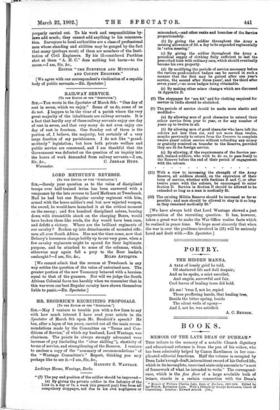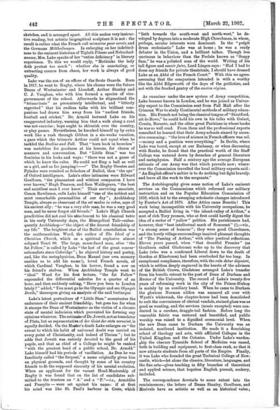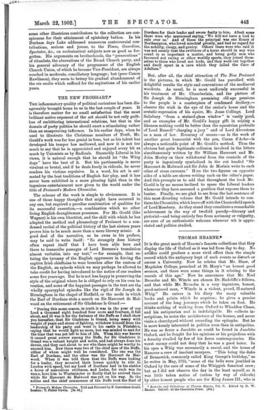BOOKS.
MEMOIR OF THE LATE DEAN OF DURHAM.• Tiers tribute to the memory of a notable Church dignitary and educational reformer is from the pen of his widow, who has been admirably helped by Canon Rawlinson in her com- plicated editorial functions. Half the volume is occupied by Dean Lake's rough-draft, intermittent record of his Oxford life, which in its incomplete, unrevised state only amounts to "a sort of framework of what he intended to write." The correspond- ence, which is the fine four of a large available bulk of letters, stands in a certain connection with the Dean's • Memoir of William Charles Lake, Dean of Durham, 18.39.18P4. Edited by his Widow, Katharine Lake. With a Preface by George Itawlinson, Canon of Canterbury. London Edward Arnold. [He.]
sketches, and is arranged apart. All this makes very instruc- tive reading, but artistic biographical sculpture it is not : the result is rather what the French call mcimoires pour Berth-, and the Germans Mittheilungen. In enlarging on her indebted- ness to the eminent historian of Tiglath Pileser and Nebuchad- nezzar, Mrs. Lake speaks of her "entire deficiency" in literary experience. To this we would reply, "Methinks the lady doth protest too much " : whether she is annotating, or extracting cosmos from chaos, her work is always of good quality.
Lake was the son of an officer of the Scots Guards. Born in 1817, he went to Rugby, where his chums were the future Deans of Westminster and Llandaff, Arthur Stanley and C. J. Vaughan, who with him formed a species of vice- government of the school. Afterwards he stigmatised the "triumvirate " as prematurely intellectual, and " bitterly regretted" that his endless talks with his brilliant com- panions had drawn him away from his " earliest friends, football and cricket." Dr. Arnold lectured Lake on his exaggerated industry, warning him that a walk along a road was not exercise ; boys ought to skirmish over the country, or play games. Nevertheless, he knocked himself up by extra work like a rush through Gibbon in a six-weeks vacation, a pace which the triumvir Arthur could not equal when he tackled the Decline and Fall. That " born book in breeches" was matchless for goodness at his lessons, for charm of manners and conversation. But "Little Stan." was too feminine in his looks and ways : " there was not a game of which he knew the rules. He could not fling a ball as well as a girl, and as for. jumping !—" The Rugby Orestes and Pylades were reunited as Scholars of Balliol, then "the eye" of Oxford intelligence. Lake's other intimates were Edward Goulburn, "the pleasantest and wittiest companion I have ever known," Hugh Pearson, and Sam Waldegrave, " the best and saintliest man I ever knew." Their surviving associate, Canon Rawlinson, calls Lake himself "one of the noblest and most remarkable personalities of our day" ; Archbishop Temple, always so observant of the est modus in rebus, says of his ancient ally : " he was a very able man, he was a very good man, and he never forgot old friends." Lake's High Church proclivities did not cool his attachment to his classical tutor in his early University days, the Evangelical Tait—subse- quently Archbishop—" the object of the dearest friendship of my life." The brightest star of the Balliol constellation was the mathematician Ward, the author of The Ideal of a Christian Church, which as a spiritual explosive almost eclipsed Tract 90. The large, moon-faced man, alias "the fat Fellow," is called by Lake "the last of the great conver- sationalists since Coleridge" ; he abjured history and poetry, and, like the metaphysician, Dean Mansel (oar own memory enables us to add his name!), loved French novels, of which Cardinal Vaughan, to his horror, found a row on his friend's shelves. When Archbishop Temple went to " ideal " Ward for his first lecture, "the fat Fellow" expounded the differential calculus for a quarter of an hour, and then suddenly asking, " Have you been to London lately P " added, " You must go to the Olympic and see Olympic Devils," thereupon giving an analysis of the said burlesque.
Lake's latest portraiture of " Little Stan." accentuates the endurance of their ancient friendship; but goes too far when it stamps the Dean of Westminster as the victim of a chronic state of mental indecision which prevented his forming any opinions whatever. The estimate-of Dr. Jowett, not as translator of Plato, but as representative of der Geist der stets verneint, is equally decided. On the Master's death Lake enlarges on " the extent to which his habit of universal doubt was carried on every point of Christianity, and indeed of Theism " ; but he adds that Jowett was entirely devoted to the good of his pupils, and that as chief of a College he might be ranked "with the greatest head of a public school, Dr. Arnold." Lake himself had his periods of vacillation. As Don he was familiarly called " the Serpent," a name originally given him on physical grounds, and thought by some of his country friends to fit the supposed sinuosity of his mental evolution. When an applicant for the vacant Head-Mastership of Rugby it was found that on the list of candidates sub- mitted to the trustees an " A." and a "P."—i.e., Arnoldite and Puseyite — were set against his name: if at first his mind was like St. Paul's harbour in Crete, which " lieth towards the south-west and north-west," he de- veloped by degrees into a moderate High Churchman, in whom, perhaps, secular interests were dominant. In the " pulpit drum ecclesiastic" Lake was at home ; he was a ready debater in the Union, and a brilliant talker. Though less unctuous in behaviour than the Prelate known as "Soapy Sam," he was a polished man of the world. Writing of his tall figure and savoir faire, Lord Lingen says : " Had I bad to dress my Mende for private theatricals, I should have dressed Lake as an Abbe of the French Court." With this we agree. assuming that the comparison intended is with a worthy like the Abbe Edgeworth of the days of the guillotine, and not with the (rocked gentry of the ancien regime.
As examiner under the new system of Army competition, Lake became known in London, and he was joined as Univer- sity expert to the Commission sent from Pall Mall after the Crimean War to study Continental methods of military educa- tion. His French not being the classical tongue of " Stratford.. att-le-Bowe," he could hold his own in his talks with Guizot, Cousin, Barante, and the other great Parisians in whose books he was so well read. From them and the professional experts consulted he learned that their Army schools sinned by exces- sive cramming : " the love of science in French officers was nil, —money and a position were everything." In Berlin, where Lake was bored, except at our Embassy, or when discussing with Ranke, he found that the practical worth of the Staff College was watered down by drenches of general literature and metaphysics. Half a century ago the average European estimate of our Army was that which prevails now; where- ever the Commission travelled the local military experts said : " An English officer's metier is to do nothing but fight bravely, and leave all the work to the sergeants."
The Autobiography gives some notion of Lake's eminent services on the Commissions which reformed our military instruction and on the Popular Education Commission of 1858, which led to the sweeping scholastic changes introduced by Forster's Act of 1870. After Attica came Boeotia! This work being incompatible with his University occupations, he accepted a Balliol living in "the island-valley of Avilion," a nest of rich Tory yeomen, who at first could hardly digest the idea of a rector of " yallow " politics. His parishioners had, however, that "best intellectual mark of Somerset" (!),—viz., " a strong sense of humour " ; they were good Churchmen, and the lovely village surroundings inspired pleasant thoughts of " The Passing of Arthur," with other poetical reflections. Eleven years passed, when "that dreadful Premier" (as Goulburn called Gladstone) woke up to the discovery that Lake (who was a confirmed Liberal down to the death of Gordon at Khartoum) had been overlooked far too long. In exceptional compliance, therefore, with the rule detur digniori, which is seldom deeply engraved in the hearts of the advisers of the British Crown, Gladstone arranged Lake's transfer from his bucolic retreat to the post of Dean of Durham and Rector of the University. The record of Lake's twenty-five years of reforming work in the city of the Prince-Bishop is mainly by an auxiliary hand. When he came to Durham the glorious Norman edifice was smeared all over with Wyatt's whitewash, the chapter-house had been demolished to suit the convenience of clerical vandals, stained glass was as good as wanting, and the services (music excepted) were con- ducted in a careless, draggle-tail fashion. Before long the venerable fabric was restored and beautified, and public worship was raised to a dignified ceremonial level. When the new Dean came to Durham the University was an isolated, moribund institution. He made it a flourishing school of theology and arts, with affiliated Colleges in the United Kingdom and the Colonies. Under Lake's warden. ship the obscure Tyneside School of Medicine was raised, both in building and equipment, to first-class rank, so that it now attracts students from all parts of the Empire. Finally, it was Lake who founded the great Technical College of New.. castle, which—let alone the classics, literature, languages, and the fine arts—gives teaching in fifty branches of theoretical and applied science, that hopeless English pursuit, cookery, included.
The correspondence dovetails to some extent into the reminiscences; the letters of Deans Stanley, Goulburn, and Merivale have an artistic as well as an historical value ; some other illustrious contributors to the collection are con- spicuous for their attainment of epistolary bathos. In his Durham days Lake addressed numerous controversial con- tributions, serious and jocose, to the Times, Guardian,
Spectator, on ecclesiastical subjects now as good as for- gotten. His arguments on brotherhoods, the " persecutions " of ritualists, the aberrations of the Broad Church party, and his general advocacy of the programme of the English Church Union, of which he became Vice-President, are always couched in moderate, conciliatory language ; but (pace Canon Rawlinson), they seem to betray his gradual abandonment of the via media which sufficed for the aspirations of his earlier years.












































 Previous page
Previous page